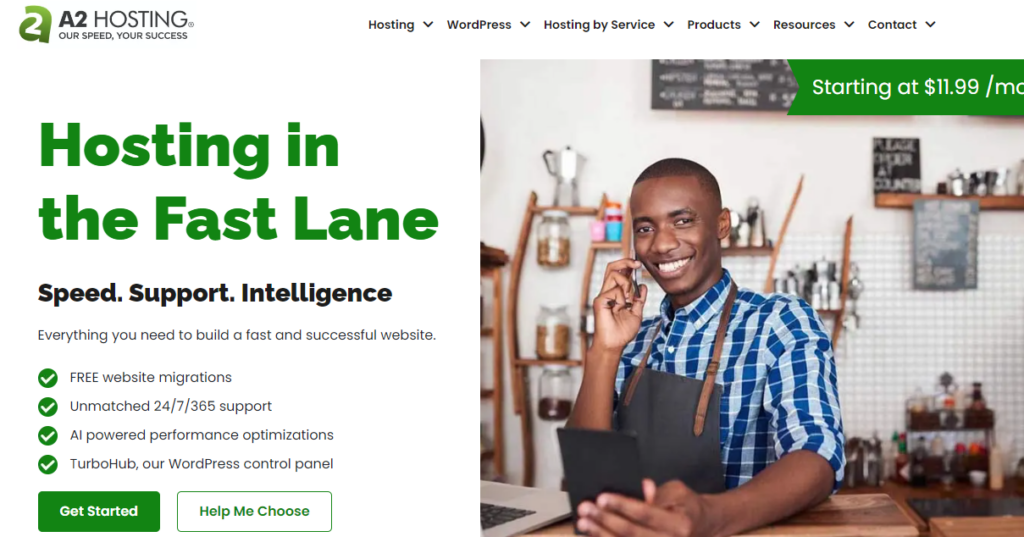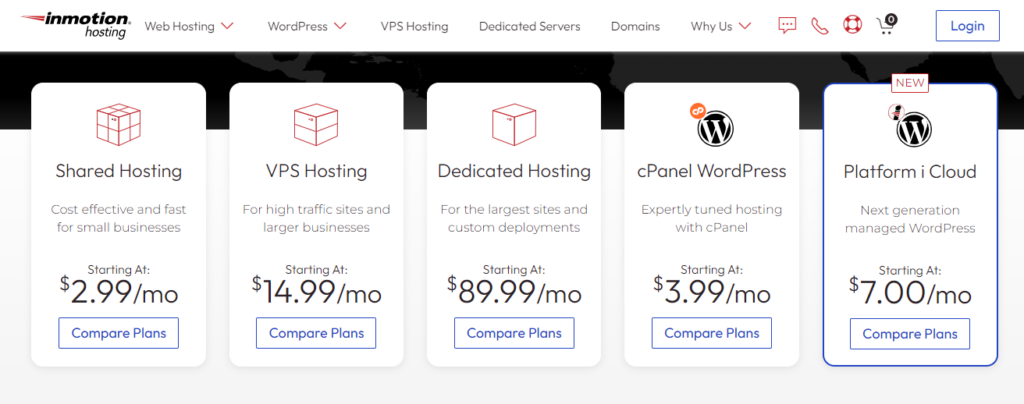Joomla is a popular open-source content management system (CMS) used to build and manage websites and online applications. Some key benefits of using Joomla include:
- User-friendly interface and administration panel makes it easy for beginners
- Extensive library of templates, extensions and integrations
- Built-in SEO and marketing tools
- Secure and scalable with robust community support
- Completely customizable and flexible for all types of websites
With over 3% of the web running on Joomla, it powers everything from personal blogs to enterprise company sites. Choosing the right Joomla hosting is key though to get the best performance.
Table of Contents
Things to Consider When Choosing Joomla Hosting
There are several key things to evaluate when selecting a hosting provider for your Joomla site:
Server Configuration
- Operating System – Linux is recommended
- PHP version 7.2+
- MySQL 5.6+
- Apache or Nginx web server
Database Support
Joomla requires MySQL, so make sure the host provides:
- Unlimited databases
- Current MySQL version
- Easy database management
Joomla Optimizations
Look for hosts that offer:
- Built-in Joomla auto-installer
- Pre-configured PHP settings
- Joomla performance tweaking
Security
With data breaches so common, security is crucial:
- SSL certificate
- Firewall protection
- Secure FTP access
- Anti-malware scanning
Scalability
As your traffic grows, ensure your host can scale:
- Quick resource addition
- Cloud hosting upgrades
- Caching and CDN integration
Here are some top Joomla hosting providers to consider with these criteria in mind.
Top Hosting Providers Optimized for Joomla
Choosing the right web host is one of the most important decisions when building a Joomla website.
With so many options though, selecting a hosting provider tailored specifically for Joomla can be challenging.
The best Joomla hosts have servers optimized for top performance out-of-the-box, key security protections, site management tools, and top-notch support.
Specialized hosting can help take your Joomla site to the next level.
Below we detail the top five Joomla hosting providers that check all the boxes:
1. Truehost.co.za – Best Overall

Truehost specifically optimizes their hosting for Joomla sites leveraging custom configurations and proprietary technology for speed and security.
Key Features:
- Specialized Joomla configurations
- Built-in SG Optimizer plugin
- Free CDN and SSL certificate
- NGINX web server technology
- Automatic updates for Joomla and extensions
- In-house SuperCacher for custom caching
- Cloudflare integration
Their Silver shared plan also includes managed WordPress hosting useful for multi-CMS sites.
With world-class support and a risk-free 30 day money back guarantee, Truehost is a savvy choice.
2. Kinsta – Best Managed Joomla Host

If you want a hands-off hosted Joomla experience, Kinsta is the leading managed Joomla hosting provider.
Managed Service Includes:
- Server administration
- Joomla core updates
- Extension updates
- Daily backups
- Site monitoring
- 24/7 support
Built on Google Cloud Platform, they offer impressive performance with CDN, HTTP/2 servers, and SSD drives included.
Best for larger and enterprise sites, their managed solution gives peace of mind so you can focus solely on your Joomla site rather than server upkeep.
3. A2 Hosting – Fastest Speeds

Boasting up to 20X faster page loads, A2 Hosting leverages custom server technology and a high-performance infrastructure perfect for Joomla.
Speed Features:
- Turbo Servers
- CDN
- HTTP/2
- SSD Drives
- Caching
- GZIP Compression
Their exclusive Turbo Boost automatically caches static assets as well as OPcache for ultra-optimized PHP. Shared hosting starts under $4/month backed by a 99.9% uptime commitment.
With possibly the fastest host around ready to handle today’s image and video-heavy sites, they eliminate hosting bottlenecks.
4. InMotion Hosting – Most Scalable

From shared servers to dedicated boxes, InMotion Hosting allows immense vertical scalability perfect for growing Joomla sites without migrations.
Scalability & Growth:
- Shared hosting
- VPS hosting
- Dedicated servers
- High resource guarantees
- Effortless scaling between tiers
- Worry-free transfers between accounts
They offer free data backups, an SSD drive, max memory control panel for optimized configs, and bundled CDN.
Excellent performance plus scalability to grow makes InMotion stand out.
5. Liquid Web – Most Reliable

With an average of 15+ years experience, Liquid Web has the most knowledgeable support combined with high-performing dedicated servers perfect for business-critical Joomla sites.
Reliability Features:
- 100% uptime guarantee
- Highly-available storage
- Enterprise hardware
- Cloud sites with automatic failover
- Managed solutions
- Expert support
While costlier than shared hosting, Liquid Web data centers deliver reliable sites no matter the traffic.
With custom server optimization for Joomla available, they offer unparalleled reliability.
Find Your Optimized Joomla Host Today
All five providers above have solutions tailored specifically for Joomla from optimizations to architecture allowing for the highest performance install possible.
They eliminate the need for extensive Joomla configuration and tuning.
While budget and needs play a role when deciding on hosting, specialized environments purpose-built to run Joomla sites exceptionally well should be strongly considered.
This allows focusing efforts on creating amazing content and applications rather than server admin.
By selecting a premier Joomla optimized host leveraging the newest technology like PHP 7.4 and HTTP/2, your site will operate at peak efficiency right out-of-the-box.
So don’t settle for shared servers designed for WordPress or basic LAMP stacks.
Choose a host today that helps your Joomla site deliver the speed, security, and scalability top sites require for years to come.
Your developers, customers, and search engines will thank you!
Read also: Best WordPress Hosting in South Africa: Top Providers
Joomla Hosting Features to Look For
In addition to the criteria above, there are some key hosting features to enable optimal performance for a Joomla site:
One-Click Joomla Installer
Choose a host like Truehost.co.za that allows seamless installation of Joomla to get your site up and running quickly.
Pre-Configured PHP/MySQL
Optimized PHP and MySQL settings out-of-the-box prevent needing to manually tune your configuration.
Automatic Updates
Automatically updated versions of Joomla and extensions improve security and performance.
Caching and CDN
Caching reduces server load times while a CDN stores static files globally for faster content delivery.
Daily Backups
Automatic daily backups provide peace of mind over lost or corrupt site files.
Free SSL Certificate
An SSL certificate encrypts data and protects user privacy for secure HTTPs connections.
Server Optimization
Specialized web servers like NGINX finely tuned for optimal Joomla performance.
Managing Your Joomla Site
Once your Joomla site is up and running, ongoing management best practices include:
Update Joomla Core and Extensions
- Update to latest Joomla version
- Use one-click extension updater
- Review changelogs before updating
- Test site after updating
Backups and Security
- Schedule automatic backups
- Generate backup before major site changes
- Install security extensions
- Leverage .htaccess file
Performance Monitoring
- Track site traffic
- Monitor load times
- Identify bottlenecks
- Boost resources if needed
Scaling Resources
- Vertical scaling to increase plan
- Horizontal scaling to add servers
- Enable caching and CDN
Proper hosting and site management will lead to the best, most secure Joomla site possible.
Read also: A Guide to Free Student Web Hosting
Migrating an Existing Joomla Site to New Hosting
Migrating an existing Joomla site to a new hosting provider may become necessary over time if you outgrow your current hosting resources, need more features, or are simply unsatisfied with your current provider’s performance or support.
While a Joomla migration process may seem straightforward on the surface, it requires precision and care to avoid common pitfalls that can disrupt your site.
Following proven steps and best practices is key to seamlessly transferring your Joomla site and avoiding any downtime.
Why Migrate Joomla Hosting Providers
There are a few common reasons you may need to migrate web hosts for an established Joomla site:
- Limited resources – Traffic is exceeding allocated bandwidth, storage is full, or site is slow.
- Seeking better features – Current host lacks backups, security, or newer PHP versions.
- Too expensive – Ready for dedicated server but shared hosting is cost prohibitive.
- High downtime – Experiencing frequent outages disrupting business.
- Poor support – Not getting issues resolved in timely manner.
While transferring hosts seems like an annoyance, selecting a specialized Joomla optimized hosting provider can significantly enhance performance, security, uptime and provide room to scale.
Step 1 – Full Site Backup
Before making any hosting or site changes, the very first step is:
This includes:
- Joomla database
- Site source code – All Joomla files and folders
- Media assets – Images, documents, and resources
Backups can be created:
- Manually – Via cPanel or FTP
- Automated – Using backup extensions
- Migration tools – Services like Duplicator Pro
If any issues crop up during the migration, you can restore this backup and prevent downtime.
Step 2 – Select Your New Joomla Hosting Provider
Once backed up, it’s time for the fun part – selecting a new optimized Joomla hosting provider!
Key features to consider:
- Joomla auto-installer
- Pre-configured PHP and MySQL
- Integrated caching and CDN
- Server technology like LiteSpeed or NGINX
- Cloud-based resources and scalability
Do your homework to match technical needs and budget. Top hosts include SiteGround, Kinsta, and A2 Hosting specifically tailored for Joomla.
Step 3 – Point Domain Name to New Host
Now with new hosting account established, point your domain name to new hosting servers:
- Update nameservers at registrar
- May take up to 48 hours to propagate
- Creates seamless user transition to new host
Step 4 – Upload Joomla Site Data
2 major options for “pushing” site data to new host:
Full Site Migration
Utilize migration tools to automate transferring:
- Database
- File system
- Config files
- Asset upload
Ensures uniform transfer without inconsistencies.
Manual Data Transfer
If going manual route:
Export database
- Save SQL using cPanel or phpMyAdmin
- Compress file
Transfer files
- Compress site folder
- Upload zip via FTP
Adjust configuration
- Update paths and database credentials in configuration.php
While more complex, manual process gives room for customization.
Step 5 – Update Domain’s A Record
The final technical step is updating DNS A record to new host’s IP address to direct traffic properly. This requires updating the A record with:
- Host provider’s nameservers
- Host IP address
After about 24 hours, site visitors are directed seamlessly to migrated site.
Step 6 – Post-Migration Site Testing
Before celebrating, significant testing must be done to validate full site functionality:
- Site frontend – Test all pages and navigation
- Site backend – Ensure admin panel works
- Extensions – Validate all integrations
- Speed tests – Check for performance improvements
- Visual tests – Confirm design and layout
- Browser tests – Site works across browsers
Only with exhaustive testing can you confirm site stability.
Step 7 – Submit Sitemap to Search Engines
To minimize any SEO impact from URL changes, once migrated:
- Generate full XML sitemap
- Submit sitemap to search engines
- Leverage webmaster tools for inspection
Helps search bots reindex new site location properly.
Migrations Take Planning
When tackling a Joomla site migration, the steps for seamlessly transferring your live site to optimized hosting may seem overwhelming.
But with website backups, following the process methodically, and extensive post-migration testing, you can transition hosts with no downtime.
Patience and diligence are key though for a smooth website migration.
So don’t fear host changes!
Embrace the opportunity to boost your site’s performance, security, and scalability with a hosting provider purpose-built for Joomla.
Your site will thank you!
Optimizing Your Hosted Joomla Site
Once migrated to optimized hosting, further tune performance with:
GZIP Compression
Reduce file sizes for faster page loads.
Leverage Browser Caching
Store static assets in browser to prevent re-downloads.
Minify JS/CSS
Shrink file sizes of JavaScript and CSS resources.
Content Delivery Network
Use a CDN to cache assets globally for lightning fast delivery.
Adjust MySQL config based on traffic patterns for optimal database interactions.
Key Takeaways
- Choose specialized Joomla hosting for best performance and ease of use
- Key features include one-click installer, Joomla-optimized servers, CDN and caching
- Follow best practices for updating, security, backups, and monitoring
- Additional fine-tuning optimizes assets and database for faster page loads
- Migrating Joomla sites takes planning but prevents downtime or issues
